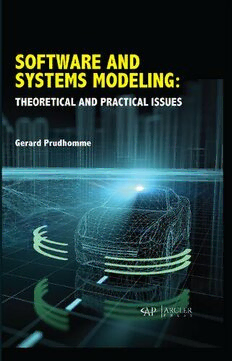Table Of ContentSOFTWARE AND SYSTEMS
MODELING: THEORETICAL AND
PRACTICAL ISSUES
SOFTWARE AND SYSTEMS MODELING:
THEORETICAL AND PRACTICAL ISSUES
Gerard Prudhomme
ARCLER
P r e ss
www.arclerpress.com
Software and Systems Modeling: Theoretical and Practical Issues
Gerard Prudhomme
Arcler Press
2010 Winston Park Drive,
2nd Floor
Oakville, ON L6H 5R7
Canada
www.arclerpress.com
Tel: 001-289-291-7705
001-905-616-2116
Fax: 001-289-291-7601
Email: [email protected]
e-book Edition 2019
ISBN: 978-1-77361-582-0 (e-book)
This book contains information obtained from highly regarded resources. Reprinted material
sources are indicated and copyright remains with the original owners. Copyright for images and
other graphics remains with the original owners as indicated. A Wide variety of references are
listed. Reasonable efforts have been made to publish reliable data. Authors or Editors or Publish-
ers are not responsible for the accuracy of the information in the published chapters or conse-
quences of their use. The publisher assumes no responsibility for any damage or grievance to the
persons or property arising out of the use of any materials, instructions, methods or thoughts in
the book. The authors or editors and the publisher have attempted to trace the copyright holders
of all material reproduced in this publication and apologize to copyright holders if permission has
not been obtained. If any copyright holder has not been acknowledged, please write to us so we
may rectify.
Notice: Registered trademark of products or corporate names are used only for explanation and
identification without intent of infringement.
© 2019 Arcler Press
ISBN: 978-1-77361-380-2 (Hardcover)
Arcler Press publishes wide variety of books and eBooks. For more information about
Arcler Press and its products, visit our website at www.arclerpress.com
ABOUT THE AUTHOR
Gerard I. Prudhomme has a graduate degree (M.S.) for Computer Science
from University College London (UCL). He has also worked as a software
programmer and tech writer for different Fortune 500 companies, and
studied at UCL, Harvard, and Oxford.
TABLE OF CONTENTS
List of Figures ................................................................................................xi
Preface........................................................................ ................................xix
Chapter 1 Facilitating Access to the Multi-Mode Information of a User ....................1
Chapter 2 Weighted Semantic Networks .................................................................11
2.1. The Degree Of Involvement of the Different Phases ..........................12
Chapter 3 Development of a Prototype ...................................................................17
Chapter 4 A Generic Personalization Tool Based on a Multi-Agent
Architecture ............................................................................................21
Chapter 5 Comparative Study of Methods of Designing Computerized
Information Systems ................................................................................27
5.1. Use Case Driven Object Modeling With UML ..................................28
Chapter 6 Scientific Computation ............................................................................31
6.1. Sample Data For a Search Query ......................................................40
Chapter 7 Architectures and Methods for Development .........................................51
7.1. Adaptive Systems and User Modeling on The Web ............................57
7.2. Data Modeling ..................................................................................58
Chapter 8 Exploring the Web with Agents ...............................................................61
Chapter 9 An Intelligent Graphical User Interface ..................................................65
Chapter 10 Computer Design ....................................................................................73
Chapter 11 Methodology Phases Involved Analysis Specification ..............................79
Chapter 12 Agent Research and Development ..........................................................85
Chapter 13 Unified Process Degree of Involvement ..................................................89
Chapter 14 Structured Programming .........................................................................95
Chapter 15 Database Object Component ................................................................105
Chapter 16 Asynchronous Processing ......................................................................109
Chapter 17 UML Formalism .....................................................................................119
Chapter 18 Extending UML ......................................................................................125
18.1. Processing Client-Server Representations ......................................129
Chapter 19 Incremental Development .....................................................................137
Chapter 20 User Modeling and User-Adapted Interaction .......................................143
Chapter 21 Architectures and Methods for Customized is Development ................149
21.1. References For Development Methodology ..................................154
Chapter 22 Intelligent Agents ..................................................................................161
22.1. Agent Theories ..............................................................................163
Chapter 23 Architectures and Languages .................................................................165
Chapter 24 Multi-Factor Concepts ...........................................................................177
Chapter 25 Guiding Constraint Relaxations .............................................................181
Chapter 26 Distributed Constraint Satisfaction .......................................................185
26.1 Prototypes of User Model-Based Intelligent Agents .......................186
Chapter 27 Document Filtering and Navigation ......................................................195
Chapter 28 Agent Communication Languages .........................................................197
Chapter 29 A New Graph-Theoretic
Approach ..............................................................................................199
Chapter 30 User Modeling and Personalization of Human-Computer Interaction ..201
Chapter 31 Modeling Rational Agents .....................................................................205
viii

